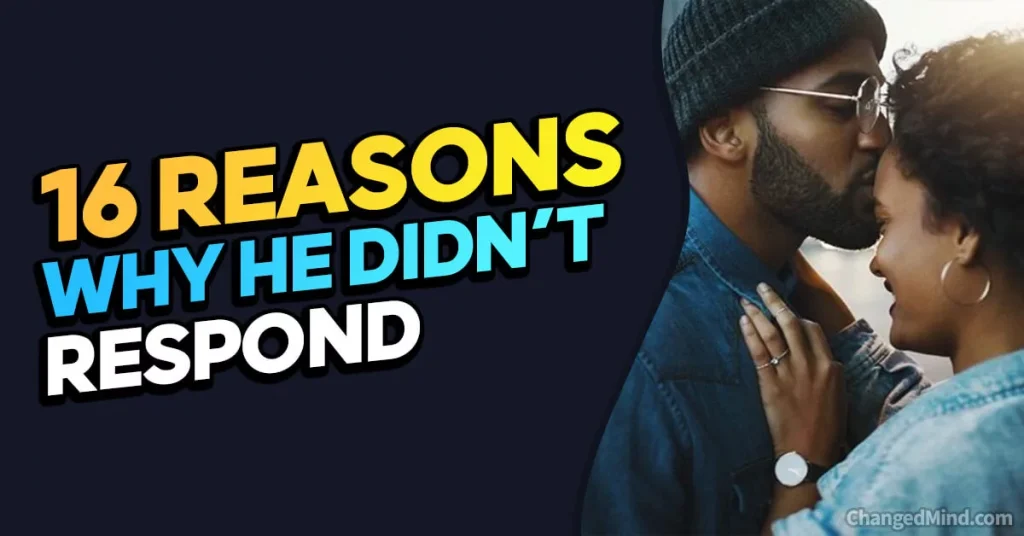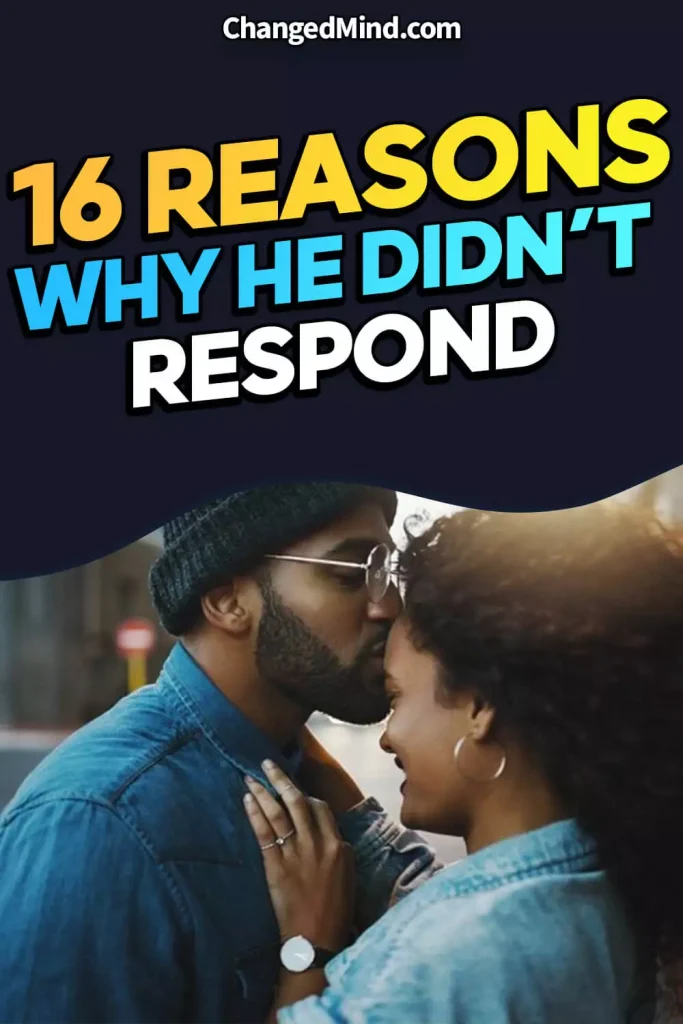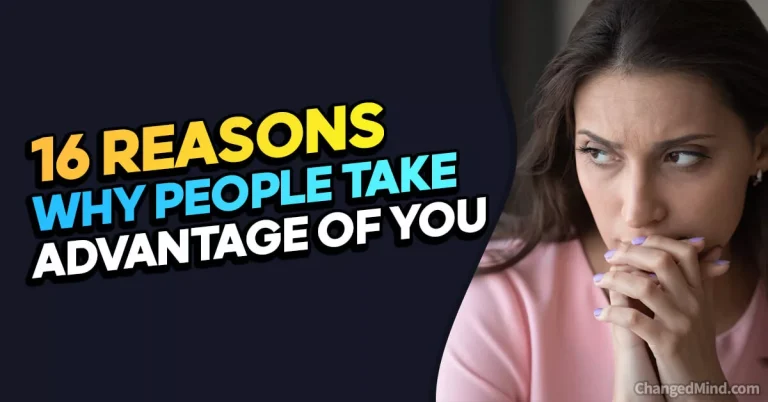You poured your heart out, but the response was…silence. It’s a situation that can leave your heart in suspense and your mind racing with questions.
Did he not get the message? Or is there something more behind his quietness? Fear not, for in this enlightening journey, we’ll explore the mysteries of unspoken words and the enigma of non-responses.
In a world where words often hold the power to heal, connect, or complicate matters, we’ll dive into the intricacies of that unread message, unsent letter, or unspoken confession. So, why did he remain silent when you shared your feelings?
From the whimsical to the profound, we’ve gathered 16 likely reasons that promise to unravel the silence and bring you clarity.
In this article, we’re delving into the mystery of why he didn’t respond when you expressed your feelings.
Join us as we decode the nuances of human emotions, decipher the hidden meanings of inaction, and explore the myriad possibilities of what might be going on inside his mind. Whether you’re navigating the realms of romance or simply curious about the human heart, this article holds insights that are bound to resonate.
Let’s dive in together and discover what lies beneath the unanswered text, offering you solace and a deeper understanding of the complexities of love and communication.
Expressing your feelings for someone can be a vulnerable and courageous act. However, it can be disheartening when the person doesn’t respond as you hoped.
There can be various reasons behind their lack of response, and it’s important to understand and cope with the situation.
What does it mean when a guy doesn’t respond or doesn’t respond well after you express your feelings to him?
Here are 16 likely reasons for no response when you express your feelings to someone, followed by suggestions for coping with the situation.
- He Needs Time to Process.
- He is Unsure of His Feelings.
- He is Afraid of Rejection.
- He is Commitment-Phobic.
- He is Dealing with Personal Issues.
- He is Not Ready for a Relationship.
- He is Waiting for the Right Moment.
- He is Evaluating the Compatibility.
- He is Playing Games.
- He is Not Emotionally Available.
- He is Not Interested Romantically.
- He is Already in a Relationship.
- He is Waiting for You to Make a Move.
- He Didn’t Understand Your Intentions.
- He is Avoiding Confrontation.
- He Wants to Maintain the Friendship.
While navigating through no response can be challenging, it’s essential to cope with the situation in a healthy manner. Here are some suggestions to help you cope:
- Give Him Some Space: Allow him time and space to process his feelings.
- Communicate Your Feelings Clearly: Clearly express your feelings and intentions to avoid misunderstandings.
- Evaluate Your Own Expectations: Reflect on your own expectations and be open to different outcomes.
- Consider Seeking Support from Others: Reach out to friends or a support system to talk about your emotions.
- Focus on Self-Care and Healing: Prioritize self-care activities to heal and take care of yourself during this time.

Remember, everyone’s journey and response may vary. It’s important to be patient and take care of yourself throughout the process.
Key takeaways:
- He may need time to process: Sometimes, someone may need time to understand and process their emotions before responding to an expression of feelings.
- Consider his uncertainty: He may be unsure of his own feelings and may need more time to figure them out before responding.
- Don’t jump to conclusions: There are various reasons for not responding, including fear of rejection, commitment issues, personal problems, or simply not being interested romantically.
Reasons for No Response
Wondering why he didn’t respond when you expressed your feelings? Let’s explore the possible reasons behind his silence. From needing time to process emotions, being unsure about his own feelings, or fearing rejection, to dealing with personal issues or being commitment-phobic, there are numerous factors at play.
Maybe he’s evaluating compatibility, playing games, or simply not emotionally available.
It’s also possible he didn’t understand your intentions or is avoiding confrontation. Or perhaps he values your friendship and wants to maintain it. Let’s dive into the complexities of human interactions and uncover the truth.
1. He Needs Time to Process
When someone doesn’t respond to your confession of feelings, it could be because he needs time to process what you’ve said. People have different ways of dealing with emotions, and some may need more time than others to fully process and understand their own feelings.
This doesn’t necessarily mean that he’s not interested or that he doesn’t care about your feelings.
During this period, it’s important to give him the space he needs without putting any pressure on him. Avoid pushing for an immediate response or constantly seeking reassurance. Allow him the opportunity to reflect on his emotions and determine how he wants to proceed.
In the meantime, focus on your own well-being and personal growth. It’s essential to understand that you don’t have control over how someone else feels or how they respond. Take this time to evaluate your own expectations and communicate your feelings clearly and honestly.
Fact: Giving someone space to process their emotions can lead to a deeper understanding and a more authentic response.
2. He is Unsure of His Feelings
When faced with no response after expressing your feelings to someone, it can be disheartening. One possible reason for this lack of response is that the person may be unsure of their own feelings. It’s important to remember that emotions can be complex and take time to sort out.
Here are a few suggestions on how to navigate this situation:
| 1. Give them space: | Recognize that they may need time and distance to figure out their emotions. Respect their need for solitude and avoid pressuring them for an immediate response. |
| 2. Communicate clearly: | Express your understanding of their uncertainty and reassure them that you are open to discussing and exploring the situation whenever they feel ready. Understand that he may be unsure of his feelings. |
| 3. Evaluate your own expectations: | Take a step back and reflect on your own expectations. Are you expecting an immediate response when they may need more time? Adjust your expectations accordingly. |
| 4. Seek support from others: | Reach out to friends or a support network to vent your feelings and gain perspective. Talking to others can offer valuable insight and guidance during this challenging time. |
| 5. Focus on self-care and healing: | Take care of yourself during this period of uncertainty. Engage in activities that bring you joy and focus on your own emotional well-being. |
Remember, everyone’s journey with their emotions is different. While it can be difficult, be patient and understanding as they navigate their own feelings.
3. He is Afraid of Rejection
When someone doesn’t respond to your expressed feelings, one possible reason could be their fear of rejection. This fear can prevent them from acknowledging or reciprocating your feelings. It is important to understand that the fear of rejection is a common and natural emotion that many people experience.
To cope with this situation, it is crucial to approach the individual with empathy and understanding. Give them space to process their emotions and allow them to open up when they feel comfortable. It is also essential to communicate your feelings clearly and honestly without pressuring them for an immediate response.
Evaluate your own expectations and be prepared for the possibility that the person may not be able to overcome their fear of rejection. Seek support from friends or loved ones who can provide guidance and perspective during this difficult time.
Ultimately, focus on self-care and healing. Remember that you deserve someone who can reciprocate your feelings and give you the love and attention you desire. He is afraid of rejection, which could explain his unresponsiveness.
4. He is Commitment-Phobic
“When someone doesn’t respond to your expression of feelings, one possible reason is that they might be commitment-phobic. Commitment-phobia is the fear of entering into a committed relationship and can cause someone to hesitate or avoid romantic involvement altogether.
This fear can stem from various factors, such as a fear of losing independence, negative past experiences, or a general discomfort with vulnerability.
If you suspect that commitment-phobia is the reason for their lack of response, it’s essential to approach the situation with understanding and patience. Pressuring them or trying to force commitment can exacerbate their fears and push them further away. Instead, consider giving them the space they need to process their emotions and make their own decisions.
Communication is crucial in these situations, so it might be helpful to have an open and honest conversation about their feelings and concerns. It’s important to remember that their commitment-phobia is their own issue to work through, and you cannot change that for them.
Ultimately, it’s up to them to address and overcome their fears before they can fully engage in a committed relationship.
5. He is Dealing with Personal Issues
When someone doesn’t respond to your expression of feelings, it may be because they are dealing with personal issues. These issues could range from work stress to emotional struggles, family problems, or health issues. It’s important to consider that their lack of response may not be about you or your feelings, but rather about what they are going through at the moment.
Give them the space they need to navigate their personal challenges and offer your support if they are open to it.
Here are some suggestions for coping with this situation:
| 1. Give them time and space to handle their personal issues without pressuring them for a response. |
| 2. Communicate your understanding and willingness to be there for them when they are ready. |
| 3. Take the time to evaluate your own expectations and consider if you can be patient and supportive during this time. |
| 4. Seek support from friends or loved ones to help you navigate your own feelings and emotions regarding the situation. |
| 5. Focus on self-care and healing, engaging in activities that bring you joy and help you maintain emotional well-being. |
Remember, everyone faces personal challenges at different times. By understanding and offering support, you can maintain a healthy relationship and navigate this situation with empathy and care.
6. He is Not Ready for a Relationship
“When someone doesn’t respond to your expressed feelings, it could be because they are not ready for a relationship. There could be various reasons for this:
1. They may need time to process their own emotions and figure out what they want.
2. They might be unsure of their feelings towards you and need time to sort them out.
3. Fear of rejection could be holding them back from taking the next step.
4. They might have commitment issues and are not ready to enter into a serious relationship.
5. Dealing with personal issues such as career or family problems could be making them hesitant to pursue a relationship.
6. He is not ready for a relationship.
If you find yourself in this situation, you can cope by giving them space and not pressuring them. Communicate your feelings clearly, but also evaluate your own expectations and consider seeking support from others. Focus on self-care and healing while understanding that everyone’s readiness for a relationship is different.
7. He is Waiting for the Right Moment
When someone doesn’t respond to your expressions of feelings, it can be frustrating and confusing. One possible reason for this lack of response could be that the person is waiting for the right moment to address your feelings. The right moment could refer to a time when they feel more emotionally prepared or when they have resolved any personal issues that might be affecting their response.
In such a situation, it is important to be patient and give them the space they need. Pressuring them for a response may only create more stress and discomfort. Instead, try to communicate your feelings clearly and honestly, while also being understanding of their circumstances.
I once confessed my feelings to a close friend, but he didn’t respond immediately. Months later, he explained that he had been waiting for the right moment to gather his thoughts and emotions. Though it was difficult to wait, we eventually had an open and honest conversation that brought us closer together. Patience and understanding were key in navigating through this situation. He is waiting for the right moment.
8. He is Evaluating the Compatibility
When someone doesn’t respond to your expressed feelings, it can be difficult to understand why. One possible reason is that they are evaluating the compatibility between the two of you. Here are some factors to consider in this situation:
- Shared values and goals: They may be assessing whether your values and goals align with theirs.
- Interests and hobbies: They could be evaluating if you have enough common interests to sustain a relationship.
- Communication style: They might be determining if your communication styles are compatible and if you can effectively communicate with each other.
- Emotional connection: They may be evaluating the level of emotional connection and chemistry they feel towards you.
- Lifestyle compatibility: They could be assessing if your lifestyles and routines can be integrated harmoniously.
To cope with no response, it’s important to give them some space, communicate your feelings clearly, evaluate your own expectations, seek support from others, and focus on self-care and healing. Remember, it’s crucial to respect their process and take care of yourself in the meantime.
He is evaluating the compatibility between the two of you to determine if you can sustain a relationship that aligns with shared values and goals, common interests, compatible communication styles, emotional connection, and lifestyle compatibility.
9. He is Playing Games
When someone doesn’t respond to your expression of feelings, it can be frustrating and confusing. One possible reason for this lack of response is that the person is playing games.
Here are some insights to help you understand this behavior:
- Inconsistent communication: They may engage in hot-and-cold behavior, showing interest one moment and then pulling away the next.
- Mixed signals: They may give ambiguous responses or send mixed messages, making it difficult to determine their true intentions.
- Manipulation: Playing games can be a way for the person to gain control or boost their ego by keeping you unsure and chasing after them.
- Testing your interest: They may withhold a response to gauge your level of interest and see how much you are willing to pursue them.
- Avoiding commitment: They may use games to maintain a sense of freedom and avoid the vulnerability and responsibilities that come with a committed relationship.
If you find yourself dealing with someone who is playing games, it’s important to consider whether this is the kind of dynamic you want to be involved in. Open communication and setting clear boundaries can help address the situation, but it’s also crucial to prioritize your own emotional well-being and consider if this relationship is healthy for you.
10. He is Not Emotionally Available
When someone doesn’t respond to your expression of feelings, it could be because he is not emotionally available. This means that he may not have the capacity or willingness to engage in a deep emotional connection.
Several factors can contribute to this:
1. Past Trauma: He may have experienced past emotional wounds that make it difficult for him to open up.
2. Fear of Vulnerability: Emotionally unavailable individuals may have a fear of being hurt or rejected if they open themselves up to others.
3. Prioritize Independence: Some people prioritize their independence and personal goals over intimate relationships.
4. Unresolved Issues: He may have unresolved emotional issues that prevent him from fully engaging in a relationship.
5. Emotional Detachment: Some individuals have learned to detach or suppress their emotions as a coping mechanism.
To cope with this situation, it’s important to respect his emotional boundaries and focus on your own well-being. Communicate your needs clearly, but also be understanding of his limitations. Seek support from friends or a therapist to process your own emotions and explore healthier relationship dynamics.
Pro-tip: Remember that you deserve someone who is emotionally available and willing to reciprocate your feelings. It’s okay to move on and seek a healthier connection.
11. He is Not Interested Romantically
When someone doesn’t respond to your expression of feelings, it can be disheartening. One possible reason could be that the person is simply not interested romantically.
It can be difficult to accept, but it’s important to acknowledge and respect their feelings.
To cope with this situation:
1. Give yourself time and space to process your own emotions.
2. Communicate your feelings clearly to the person, but be prepared for the possibility that they might not feel the same way.
3. Evaluate your own expectations and consider if there were any signs indicating their lack of romantic interest.
4. Seek support from friends or a support group to help you navigate your feelings and gain perspective.
5. Focus on self-care and healing, engaging in activities that bring you joy and fulfillment.
Remember, it is crucial to respect the other person’s feelings and boundaries. While it may be challenging, try to move forward, keeping an open mind for new romantic prospects.
Pro-tip: Take this experience as an opportunity for personal growth and a chance to discover what you truly want in a romantic partner. Sometimes, he is simply not interested romantically.
12. He is Already in a Relationship
When someone doesn’t respond to your expression of feelings, it can be disheartening. One possible reason for this lack of response is that the person is already in a relationship.
Here are a few factors to consider in such a situation:
- Commitment: The person may already be committed to their current partner and is unable or unwilling to pursue a romantic relationship with you.
- Loyalty: They may prioritize fidelity and loyalty, choosing to stay faithful to their current partner despite any potential attraction or feelings towards you.
- Emotional investment: Being emotionally invested in their current relationship may make it difficult for them to explore or entertain a connection with someone else.
- Timing: It’s possible that they are waiting for the right time to address your feelings while respecting their existing relationship and the emotions involved.
Understanding that the person is already in a relationship can help you navigate the situation with empathy and respect, while also allowing you to reflect on your own desires and expectations. Remember to prioritize your own well-being and consider seeking support from others during this time. It’s important to acknowledge that he is already in a relationship.
13. He is Waiting for You to Make a Move
When someone doesn’t respond to your expression of feelings, it can be confusing and frustrating. One possible reason for this lack of response is that the person is waiting for you to make a move.
Here are some steps you can take:
- Reflect on your own feelings and intentions. Are you ready to make a move?
- Consider the dynamics of your relationship. Is there a possibility that they are unsure of your feelings?
- Communicate clearly. Express your interest and ask them if they are open to pursuing a relationship.
- Give them time and space to process. They may need time to think about their own feelings.
- Be patient, but also consider your own needs. Don’t wait indefinitely for a response if it’s causing you distress.
- Seek support from friends or loved ones as you navigate this situation.
- Focus on self-care and personal growth, regardless of the outcome.
14. He Didn’t Understand Your Intentions
“When expressing your feelings to someone and not receiving a response, it could be because he didn’t understand your intentions.
Miscommunication or unclear signals may have led to confusion on his part. It is important to consider how you conveyed your feelings and if they were interpreted as intended.
To address this issue, you can take the following steps:
- Clarify your intentions: Clearly communicate your feelings and make sure he understands your intentions. Use direct and unambiguous language to express yourself.
- Reflect on your communication: Evaluate how you communicated your feelings. Assess if you were clear, consistent, and considerate in expressing your intentions.
- Seek clarification: If the lack of response persists, have an open and honest conversation to understand his perspective and ensure there is no misunderstanding.
- Give him time: Allow him some space and time to process the information. He may need time to consider his own feelings and thoughts before responding.
Remember that everyone has their own ways of perceiving and understanding messages. Being patient, understanding, and willing to communicate can help resolve misunderstandings and pave the way for effective communication moving forward.”
15. He is Avoiding Confrontation
When someone doesn’t respond to your feelings, one possible reason is that they are avoiding confrontation. This can stem from a fear of uncomfortable conversations or the potential fallout from expressing their own emotions. Avoiding confrontation allows them to maintain the status quo and avoid potentially hurting your feelings or damaging the relationship.
To cope with this situation, it’s important to respect their need to avoid confrontation and give them space. You can also try to communicate your feelings clearly and honestly, but be prepared for the possibility that they may not respond. It’s important to evaluate your own expectations and consider seeking support from others to help you navigate through this challenging situation.
In the end, it’s crucial to focus on self-care and healing, regardless of the other person’s response. Understanding that their avoidance of confrontation may not be a reflection of your worth can help you move forward and find peace within yourself.
16. He Wants to Maintain the Friendship
If he wants to maintain the friendship, it could be the reason why he didn’t respond to your feelings. It can be a tricky situation as he may value your friendship and doesn’t want to risk it by expressing romantic feelings.
It’s important to communicate with him about your emotions and discuss boundaries that can ensure the preservation of the friendship. Here are some suggestions on how to navigate this situation:
| 1. Accept his decision: | Understand that his intention may be to maintain the friendship and respect his choice. |
|---|---|
| 2. Have an open conversation: | Communicate your feelings honestly, but also listen to his perspective and concerns. Find common ground and establish clear boundaries. |
| 3. Give it time: | Allow both of you to process your emotions and adjust to the new dynamic. It may take time to find a balance between friendship and unrequited romantic feelings. |
| 4. Focus on the friendship: | Put emphasis on nurturing and cultivating the friendship. Spend quality time together, engage in shared interests, and support each other. |
| 5. Seek support: | Lean on friends or trusted individuals who can provide guidance and understanding during this challenging time. |
Remember that maintaining a friendship after expressing romantic feelings can be difficult, but with open communication and understanding, you can find a way to preserve the bond.
How to Cope with No Response
Finding yourself in a situation where you expressed your feelings but received no response can be challenging. In this section, we will explore effective ways to cope with this lack of response.
From giving him space to clearly communicating your feelings, evaluating your expectations, seeking support from others, to focusing on self-care and healing, we will provide practical insights to guide you through this difficult experience. Remember, you’re not alone, and there are strategies to help navigate this situation.
1. Give Him Some Space
When you express your feelings to someone and they don’t respond, it can be difficult to know how to proceed.
One important step to take in this situation is to acknowledge the need to give him some space. Here are a few steps to consider:
- Respect his need for time: Understand that he may need time to process his emotions and thoughts. Give him the space to do so and avoid pressuring him for an immediate response.
- Avoid constant contact: While it’s natural to want to reach out, refrain from bombarding him with messages or constantly seeking his attention. Allow him the freedom to initiate communication when he’s ready.
- Focus on yourself: Use this time to focus on your own well-being and personal growth. Engage in activities that bring you joy, spend time with loved ones, and invest in self-care.
- Evaluate your expectations: Reflect on your expectations for the relationship and determine if they are in alignment with his actions and communication. Consider whether you are willing to continue investing in a relationship where your needs are not being met.
- Seek support if needed: If you are struggling with the lack of response, consider confiding in a trusted friend or seeking support from a therapist or counselor who can provide guidance during this challenging time.
Remember, giving him space doesn’t mean abandoning your own feelings and needs. It’s important to find a balance between respecting his boundaries and prioritizing your own emotional well-being.
2. Communicate Your Feelings Clearly
When faced with no response after expressing your feelings to someone, it is crucial to effectively communicate your feelings clearly. This will ensure that your message is received and understood by the other person.
Here are some tips to successfully communicate your feelings:
- Choose the right time and place: Find a comfortable and private setting where you can have an open and honest conversation.
- Be honest and direct: Clearly express your feelings and intentions without being vague or beating around the bush.
- Use “I” statements: Focus on communicating how you feel rather than making assumptions or blaming the other person.
- Listen actively: Give the other person a chance to respond and truly listen to what they have to say.
- Respect their decision: Understand that the other person may need time to process their feelings or may not feel the same way.
Remember, clear communication is key in any relationship. Pro-tip: Practice active listening and empathize with the other person’s perspective to foster understanding and mutual respect.
3. Evaluate Your Own Expectations
When faced with no response after expressing your feelings to someone, it’s essential to evaluate your own expectations. Take a step back and consider what you were hoping for in return. Reflect on whether you were seeking a specific response or outcome from the person.
It’s important to remember that we cannot control how others feel or act, and everyone has their own pace and way of processing emotions.
Evaluate your own expectations by considering if they were reasonable and realistic. Did you communicate your feelings clearly without expecting a certain response? Assessing your own expectations can help you gain clarity and perspective on the situation.
Consider seeking support from others. Talk to trusted friends or family members who can offer guidance and understanding. They can provide an objective viewpoint and help you navigate your emotions.
Ultimately, the focus should shift towards self-care and healing. Take time for yourself, engage in activities that bring you joy, and prioritize your well-being. Remember that your worth and happiness are not dependent on someone else’s response or validation.
4. Consider Seeking Support from Others
- When faced with a lack of response after expressing your feelings to someone, it is important to consider seeking support from others. This can be beneficial in helping you navigate through the situation and find comfort, guidance, and a sense of community.
- One step you can take is to reach out to close friends or family members whom you trust. They can provide emotional support and offer a different perspective on the situation.
- Another option is to consider confiding in a therapist or counselor. They can provide professional guidance and help you process your emotions in a safe and confidential setting.
- Joining support groups or online communities can also be helpful. Connecting with others who have experienced similar situations allows for sharing experiences and can offer comfort and validation.
- It is also valuable to seek advice from mentors or wise individuals who have gone through similar experiences. Their wisdom and guidance can provide valuable insights and support.
- Additionally, engaging in self-help resources can be beneficial. Books, podcasts, or articles that address coping strategies for situations like yours offer practical tips and exercises to navigate through your emotions.
Remember, considering seeking support from others is an important step in dealing with unrequited feelings. It can provide you with the comfort, guidance, and sense of community you need as you navigate through the complexities of this situation.
5. Focus on Self-Care and Healing
To cope with the situation of expressing your feelings and not receiving a response, it’s important to focus on self-care and healing. Here are some steps to help you in this process:
- Give yourself time and space to process your emotions and the situation.
- Practice self-compassion and be gentle with yourself. Acknowledge your feelings and allow yourself to feel them.
- Engage in activities that bring you joy and provide self-soothing. This could be practicing hobbies, journaling, or spending time in nature.
- Take care of your physical well-being by getting enough sleep, eating nourishing food, and exercising regularly.
- Focus on self-care and healing by seeking support from friends, family, or a therapist who can listen to you and provide guidance during this difficult time.
Remember that healing takes time, and it’s important to prioritize your own well-being. By focusing on self-care, you can gradually move forward and find healing after expressing your feelings.
Some Facts About “I Expressed My Feelings For Him And He Didn’t Respond”:
- ✅ Lack of response doesn’t necessarily mean he doesn’t care. (Source: Our Team)
- ✅ Men may prioritize their careers over relationships. (Source: trulysigma.com)
- ✅ Expressing feelings over text may not be the best approach. (Source: Our Team)
- ✅ It’s important to consider the individual’s communication style and preferences. (Source: Our Team)
- ✅ Moving on and focusing on personal growth is important after rejection. (Source: trulysigma.com)
Frequently Asked Questions
Why didn’t he respond to my message expressing my feelings?
There could be various reasons why he didn’t respond to your message expressing your feelings. It is possible that he didn’t see the message if there was a problem with his phone or if he has been extremely busy with his motorway driving job. Additionally, he may not feel the same way about you or he may have other priorities such as taking his career seriously, which could have led him to ignore the message.
How can I determine if he doesn’t feel the same way about me?
If he hasn’t responded to your message expressing your feelings, it could be an indicator that he doesn’t feel the same way about you. However, it’s important to have an open and honest conversation to clarify his feelings. Look out for signs like limited eye contact, a cold response, or his focus on pursuing something non-romantic with you.
Should I walk away if he doesn’t respond to my feelings?
Walking away is an option if he doesn’t respond to your feelings. If he hasn’t expressed the same level of interest or if he consistently rejects your advances, it may be best to invest your time and energy in finding someone who values and cares about you.
How can I break the friendzone barrier with him?
If he wants to keep you around as a friend but doesn’t want to pursue a romantic relationship, breaking the friendzone barrier can be difficult. However, there are ways to do it. You can give him hints and flirt with him to show your interest. If he responds positively, there may be a chance to develop something more than a friendship.
Should I confront him face to face about the lack of response?
Having face-to-face conversations about serious relationships can provide better communication and understanding. If you feel comfortable, it may be helpful to arrange a meeting and express your concerns about the lack of response directly. This can help both of you to have a clear conversation and sort out any misunderstandings.
Where can I find advice on handling situations like this?
If you need more guidance on expressing your feelings and dealing with potential rejection, you can find helpful advice on dating sites or online dating services. These platforms often provide resources and articles tailored to personal relationships, helping you navigate through challenging situations and develop better strategies for future encounters.







